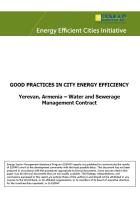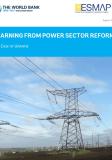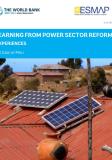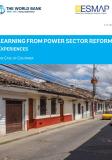Publications

In 2000, the Armenian capital’s water utility, the Yerevan Water and Sewerage Enterprise (YWSE), entered into a five-year, performance-based management contract with private operator Acea Spa Utility (Acea). Over the contract period (2000-2005), the duration of water supply was increased from 6 to 18 hours per day, collection rates improved from 20 to 80 percent, and electricity consumption was reduced by 30 percent.
Prior to the project, YWSE was in poor financial health with a very dilapidated system. Financially, the utility could not cover its operations and maintenance (O&M) costs and collections stood at a mere 20 percent. About 80 percent of those connected to the network only had access to tap water between 2 and 8 hours a day. Pumps broke down frequently and network leakages were rampant with some 72 percent of non-revenue water (NRW) (870,000 m3/day). To meet water needs, many households purchased storage tanks and apartment buildings installed costly booster pumps.
In response, the Government of Armenia (GOA) decided to solicit private sector expertise through a management contract. Acea, a joint venture led by an Italian water operator, won an open and competitive bid to operate YWSE’s system for five years. The World Bank and GOA also established an investment fund, for Acea’s capital investments in the water utility infrastructure. Over the course of the contract, Acea invested US$24.07 million for a number of targeted improvements including establishing water pressure sectors in the distribution network of three districts, purchasing and installing meters, rehabilitating several pumping stations, implementing a water leakage detection and repair program, and increasing gravity-fed water supply.
The project demonstrated that, under a conducive legal and regulatory framework, private operators can be effectively engaged using a performance-based management contract to deliver significant improvements in service quality, operational efficiency, financial performance, and energy efficiency in municipal water and sanitation utilities. Due to Acea’s strong performance and overall project results, GOA subsequently entered into a follow-on 10-year lease contract in 2005 with Veolia, a French international water company.
ESMAP. 2011. Good Practices in City Energy Efficiency: Yerevan, Armenia - Water and Sewer Management Contract. ESMAP Energy Efficient Cities Initiative. Washington, DC: World Bank.


